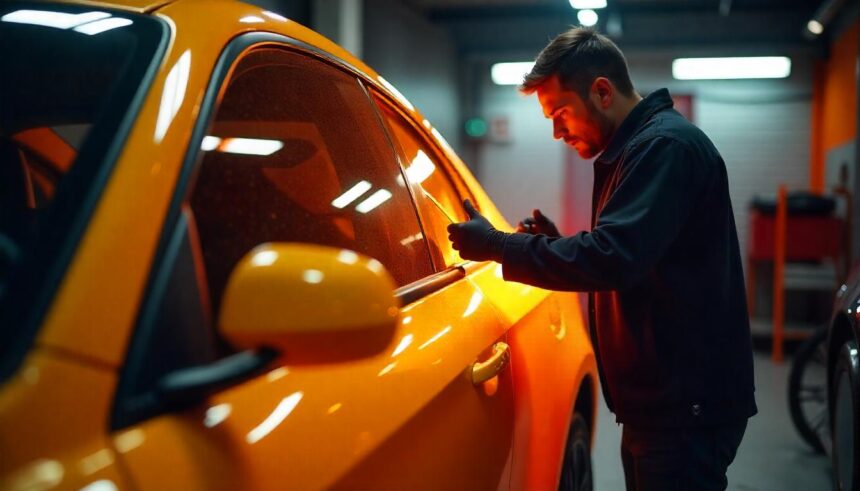Introduction to Car Window Tinting
Car window tinting has become more than just a stylish addition to your ride; it’s now seen as a necessity for many drivers. Whether you’re looking to shield yourself from the sun’s harsh rays, enhance your vehicle’s aesthetic appeal, or increase privacy while driving, tinted windows offer numerous advantages. But before you rush off to get those windows darkened, it’s essential to understand what you’re getting into—especially when it comes to costs. How much does it actually cost to tint car windows? Let’s dive deep into the factors that can affect pricing and explore whether going DIY or opting for professional help is the right choice for you.
Factors that Affect the Cost of Tinting
When considering how much to tint car windows, several factors come into play. The type of film you choose significantly impacts the overall cost. Ceramic, for example, tends to be pricier than standard dyed films due to its superior heat rejection and UV protection.
The size and number of windows also matter. Tinting a compact car will generally be less expensive than tinting an SUV or van because there’s simply more surface area involved.
Labor costs can vary by location and expertise level. A skilled technician may charge more but often offers better quality work.
Don’t forget about local regulations regarding window tint darkness; adhering to these laws can affect your choices and pricing as well. Each element contributes uniquely to the final bill, so it’s essential to consider them all when budgeting for your project.
DIY vs Professional Tinting: Which is the Better Option?
When considering how much to tint car windows, one key decision is whether to go the DIY route or hire a professional. DIY kits can be tempting due to their lower upfront cost. Many enthusiasts enjoy the challenge of applying window film themselves.
However, achieving a flawless finish takes skill and practice. Mistakes can lead to bubbling or peeling, which may require costly reapplication down the line.
On the other hand, professional services bring expertise and experience to the table. Trained technicians have access to higher-quality materials and tools that ensure a long-lasting result.
While professionals charge more initially, their work often comes with warranties that provide peace of mind. Consider your budget and comfort level with hands-on projects when making this choice. Both paths carry potential benefits but demand different investments in time and resources.
Average Cost of Car Window Tinting
The average cost of car window tinting can vary significantly based on several factors. Generally, you might expect to pay between $100 and $400 for a standard sedan.
Luxury vehicles or larger SUVs often require more material and labor, pushing the price upwards. Premium films can increase costs as well, with some high-end options reaching over $1,000.
Moreover, regional differences play a role in pricing. Urban areas typically have higher rates compared to rural locations due to demand and overhead costs.
Don’t forget about the type of tint you choose. Ceramic tints are known for their durability but come at a premium price point.
Be sure to request quotes from multiple providers before making your decision. Comparing prices will ensure you find an option that fits your budget while still meeting your quality expectations.
Additional Services and Upgrades
When considering tinting your car windows, look beyond the basic service. Many providers offer additional services that can enhance both aesthetics and functionality.
For instance, you might want to explore ceramic film options. This type provides superior heat rejection while maintaining clarity. It’s an excellent choice for those who spend long hours in their cars.
You could also inquire about protective coatings. These treatments help guard against scratches and fading, ensuring your investment lasts longer.
Some businesses even offer custom designs or graphics as part of their tinting packages. Personalizing your vehicle adds a unique touch that’s sure to catch eyes on the road.
Another upgrade worth considering is UV protection enhancements. A high-quality film can block up to 99% of harmful rays, contributing significantly to skin health inside your vehicle.
These extras not only improve the appearance but also elevate comfort levels during drives.
Benefits of Tinted Windows
Tinted windows offer a range of advantages that go beyond just aesthetics. One prominent benefit is UV protection. Tints can block up to 99% of harmful ultraviolet rays, helping to protect both your skin and the interior materials of your vehicle from fading.
Another significant advantage is temperature control. Tinted windows can reduce heat buildup inside your car, making it more comfortable on hot days and potentially saving you money on air conditioning costs.
Privacy is also enhanced with window tinting. It creates a barrier between passengers and prying eyes outside, allowing for a more secure feeling while driving or parked.
Additionally, tinted windows can provide glare reduction. This improves visibility during bright sunlight and minimizes eye strain for drivers, leading to safer journeys.
Many insurance companies offer discounts for vehicles with tinted windows due to their added security benefits against theft.
Tips for Choosing a Tinting Service Provider
Choosing the right tinting service provider can make a significant difference in your experience and results. Start by researching local companies online. Look for reviews and testimonials from previous customers to gauge their reputation.
Check if they have certifications or licenses that reflect their expertise. This can indicate a higher level of professionalism and skill in the work they perform.
Ask about the types of films they use. High-quality materials not only enhance aesthetics but also offer better longevity and performance.
Don’t hesitate to request samples or view past projects. This gives you an idea of their craftsmanship and attention to detail.
Get quotes from multiple providers before making a decision. Comparing prices will help ensure you’re getting fair value without compromising quality.
Conclusion
When considering how much to tint car windows, remember that various factors come into play. The type of film you choose, the size of your vehicle, and whether you opt for professional services or a DIY approach can significantly influence costs.
Weighing the benefits of tinted windows against the expenses is essential. Tinted windows can enhance privacy, reduce heat inside your car, and protect interior materials from UV damage. If you’re looking to upgrade your ride while enjoying these advantages, investing in window tinting makes sense.
Choosing the right service provider is critical too. Look for reputable professionals with experience and positive reviews. This ensures quality work on an important aspect of your vehicle.
Understanding all these elements will help you make informed decisions about car window tinting costs tailored to your needs and preferences.







